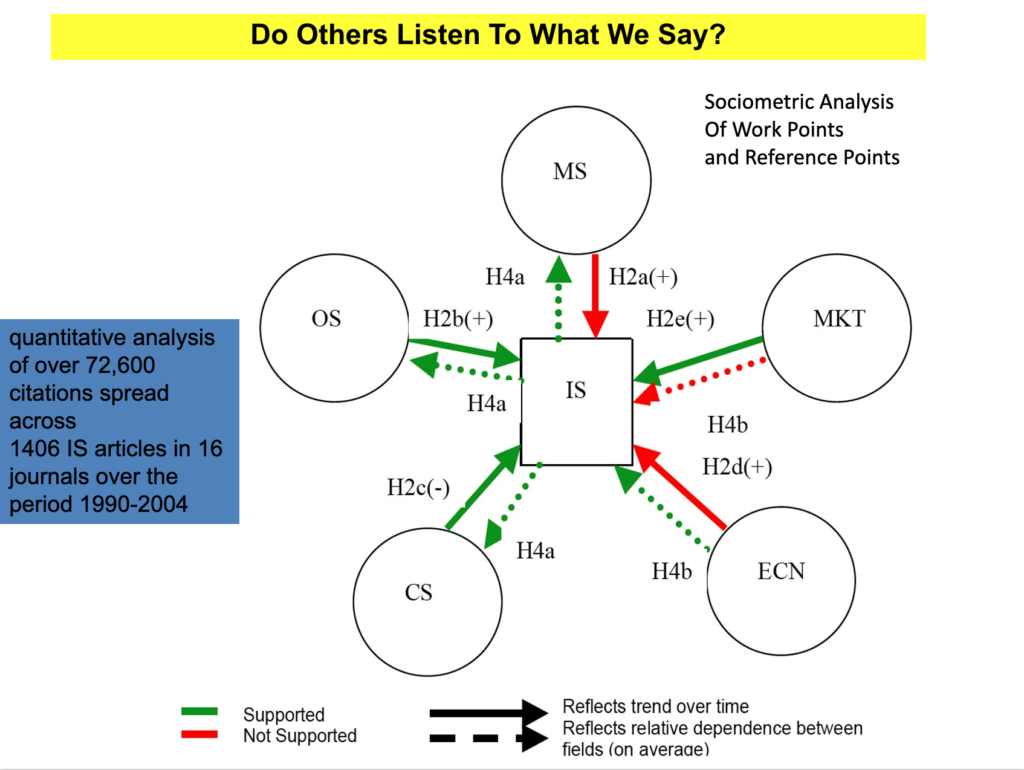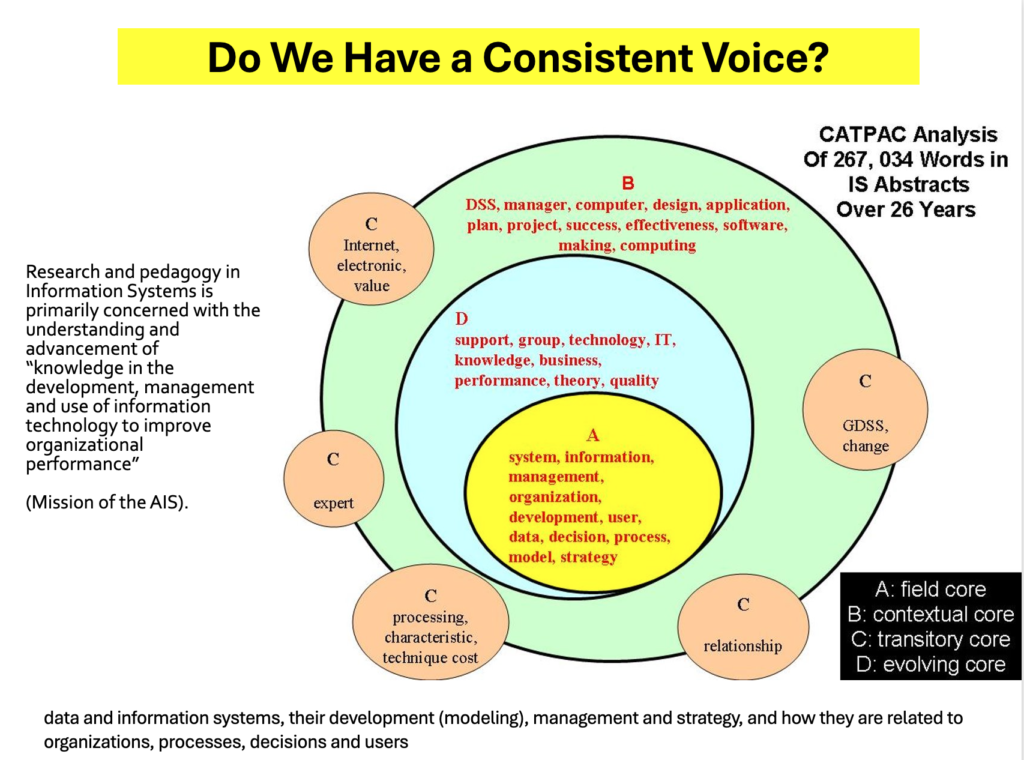To assess the impact and influence of Information Systems (IS) research beyond its immediate field, we conducted a comprehensive sociometric analysis. This study provides empirical evidence of how IS research interacts with and contributes to other related disciplines.
Methodology:
Our analysis employed the concept of “work points” to track the flow of knowledge across disciplinary boundaries. A work point represents the disciplinary origin of a publication or citation.
Study Details:
- Sample: 1,405 IS articles
- Citations analyzed: 72,600
- Time period: 1990-2024
- Journals examined: 16
- Disciplines (work points) considered: Computer Science, Organizational Science, Management Science, Marketing, and Economics

Key Findings:
Information Systems and Computer Science:
- Contrary to what might be expected, IS research was contributing more to Computer Science than vice versa.
- This suggests that IS research is providing valuable insights into the application, implementation, and organizational aspects of computing technologies.
- It indicates that IS is not merely consuming computer science knowledge but is actively shaping thinking in technical domains.
Information Systems and Organizational Science:
- IS research was found to be a net contributor to Organizational Science.
- This implies that IS studies are significantly informing our understanding of how technology impacts organizational structures, processes, and behaviors.
- It underscores the importance of IS perspectives in comprehending modern organizational dynamics in an increasingly digital world.
Information Systems and Management Science:
- The analysis revealed that IS was contributing more to Management Science than it was receiving.
- This suggests that IS research is playing a crucial role in shaping management thinking, particularly in areas related to technology strategy, digital transformation, and IT governance.
- It indicates that IS insights are increasingly relevant to broader management issues beyond just technology management.
Information Systems, Economics, and Marketing:
The exchange of knowledge between IS and both Economics and Marketing was less pronounced.
While there was some interaction, the flow of knowledge was not as significant as with the other disciplines mentioned.
This might indicate potential areas for future development in IS research, particularly in exploring economic models of information and digital marketing strategies.
Implications:
- IS as a Net Contributor: The study challenges the perception of IS as a primarily integrative discipline that mainly consumes knowledge from reference disciplines. Instead, it positions IS as a significant contributor to several key fields, especially those closely related to technology and organizations.
- Evolving Identity of IS: These findings suggest that IS has developed a distinct identity with unique insights that are valuable to other disciplines. It indicates a maturation of the field beyond its initial role as an interdisciplinary meeting point.
- Bridging Technical and Organizational Domains: The strong contribution to both Computer Science and Organizational Science highlights IS’s unique position in bridging technical and social/organizational domains. This reinforces the importance of maintaining a socio-technical perspective in IS research.
- Areas for Growth: The lesser exchange with Economics and Marketing points to potential opportunities for expanding IS research’s impact in these areas. It suggests possible directions for future research that could enhance IS’s influence across a broader spectrum of business-related disciplines.
- Validating the Field’s Progress:
- These findings provide empirical evidence of the progress made in IS research since critiques like Peter Keen’s in 1980. They demonstrate that IS has moved beyond merely generating frameworks to producing knowledge that is valuable and applicable in other disciplines.
We categorized terms based on their persistence and emergence over time, providing a nuanced view of the field’s lexical landscape.

Key Findings:
Field Core:
Consistently appearing terms include: System, Information, Management, Organization, Development, User, Data, Decision, Process, Model, and Strategy. Implication: These terms align closely with the IS field’s mission of “understanding and advancement of knowledge in the development, management, and use of information technology to improve organizational performance.”
Contextual Core:
Terms like DSS, Manager, Computer, Design, Application, Plan, Project, Success, Effectiveness, Software, Making, and Computing appeared consistently but in varying contexts. Implication: These terms provide different contexts when associated with field core terms (e.g., “information software,” “management software”), illustrating the field’s adaptability.
Transitory Core:
Terms such as “expert” and “GDSS” appeared prominently in specific periods but not in others. Implication: Reflects the field’s responsiveness to emerging technologies and methodologies, some of which may not persist long-term.
Evolving Core:
Terms like “performance” and “theory” emerged at a certain point and remained prominent in subsequent periods. Implication: Indicates the field’s growing emphasis on theoretical foundations and outcome measurement over time.
Discussion:
Stable Identity:
The consistent field core terms suggest a stable central identity for IS, focused on the interplay between information, systems, and organizational contexts.
- Adaptability:
The contextual and transitory cores demonstrate the field’s ability to incorporate new concepts and technologies, reflecting its dynamic nature. - Maturing Discipline:
The emergence and persistence of terms like “theory” and “performance” in the evolving core suggest a shift towards greater theoretical grounding and emphasis on measurable outcomes. - Alignment with Field Mission:
The field core terms strongly align with the stated mission of IS research, indicating consistency between the field’s espoused goals and its actual research focus. - Technological Responsiveness:
The transitory core reflects the field’s engagement with emerging technologies, though not all become permanent fixtures in IS research. - Interdisciplinary Nature:
The variety of terms across different cores (e.g., from technical “software” to managerial “strategy”) underscores the field’s interdisciplinary character.
This sociometric analysis offers compelling evidence that Information Systems research has established itself as a significant contributor to knowledge in several key disciplines. It challenges the notion of IS as a field that primarily consumes knowledge from others, instead portraying it as a mature discipline that actively shapes thinking in both technical and organizational domains. However, the study also highlights areas where IS could potentially expand its influence, particularly in Economics and Marketing. These insights not only validate the progress of IS as a field but also point to exciting directions for future research and cross-disciplinary collaboration.










Leave a Reply